DOWNLOAD NEWS 2016/1
By Brian Wilson and Dan Morgan
DL News 2015/11 is here
and the index of earlier editions is here.
Index 2016/1:
ALFONSO ‘el Sabio’ Cantigas – Paniagua_Pneuma
ANTHEIL Capital of the World; de BANFIELD Le Combat
– Ballet Theatre Orchestra/ Levine_Naxos Classical Archives
ARNOLD Philharmonic Concerto; Fantasy on a theme of
John Field; Symphony No.7; FIELD Nocturne No.7 – Donohoe;
RSNO/Yates_Dutton Epoch
Bach Lutheran Masses II – Suzuki_BIS (+ PERANDA Mass)
BACH, WF Keyboard Concertos – Gratton (harpsichord); Il Convito_Mirare
de BANFIELD Le Combat (see ANTHEIL)
BARTÓK Violin Concerto (see BRAHMS Violin Concerto)
BATES Mothership; Sea-Blue Circuitry; Attack Decay Sustain Release;
Rusty Air in Carolina; Desert Transport – Moran; Chang; Boston Modern
Orchestra Project/Rose_BMOP Sound
BEETHOVEN Symphony No.1; MAHLER Symphony No.1 – Hallé/Barbirolli_Beulah
BLISS Checkmate – Suite; Clarinet Quintet; Hymn
to Apollo; Music for Strings; Pastoral ‘Lie Strewn the White Flocks’
– Janet Hilton, Lindsay String Quartet; Ulster O/Handley; Sinfonia Chorus,
Northern Sinfonia/Hickox_Chandos
BLISS Pastoral ‘Lie Strewn the White Flocks’; BRITTEN
Choral Dances (Gloriana); HOLST Rig Veda Hymns
III – Holst Singers/Wetton_Hyperion
BOULEZ Le Marteau sans Maître; Dérive 1 and 2
- Hilary Summers; Ensemble Intercontemporain/Boulez_DG
BRAHMS Violin Concerto; BARTÓK Violin Concerto, Op. posth.
– Jansen; Santa Cecilia Orchestra; LSO/Pappano_Decca
BRITTEN Choral Dances (see BLISS)
CASELLA Symphonic Fragments from Le Couvent sur
l’eau; Elegia eroica; Symphony No.1 – Gillian Keith; BBC
Philharmonic/Noseda_Chandos
DELIUS Over the Hills and far away, etc. (see GRAINGER
Country Gardens)
DVOŘÁK Cello Concerto – see Great Cello Concertos_Beulah
FINZI Cello Concerto – Wallfisch; RLPO/Handley; Prelude
for string orchestra; Romance for string orchestra; Concerto for Small
Orchestra and Solo Violin – Little; City of London Sinfonia/Hickox_Chandos
FOULDS Le Cabaret; Pasquinade Symphoniques No.2;
April – England; Hellas; Three Mantras – LPO/Wordsworth_Lyrita
GRAINGER Country Gardens, etc. - Eastman-Rochester Pops Orchestra/Fennell;
DELIUS Over the Hills and far away; Summer Night on the River
– RPO/Beecham; Brigg Fair - Philadelphia Orchestra/Ormandy_Beulah
GRANADOS Piano Quintet; TURINA Piano Quintet – Perianes;
Cuarteto Quiroga_Harmonia Mundi
GRANADOS Goyescas; Escenas poéticas; Intermezzo
de la Ópera Goyescas; El pelele (Escena goyesca) – Celis_BIS
HANDEL Arias for Francesca Cuzzoni – Bennani; Les Muffatti/van
Heyghen_Ramée; Saffer; Philharmonia Baroque Orchestra/ McGegan_ Harmonia
Mundi
— Partenope – Jaroussky, Gauvin; Pomo d’Oro/Minasi_Erato
HAYDN etc The Parisian Symphony – Les Agrémens/van
Waas_Ricercar
— Cello Concerto – see Great Cello Concertos_Beulah
HOLST Rig Veda Hymns III (see BLISS)
ISAAC Missa Misericordias Domini, etc. – Cantica
Symphonia_Glossa
IVES Symphony No.4; The Unanswered Question; Central
Park in the Dark; Symphony No.3 – Cristina Valdés; Joseph Adam;
Stilian Kirov, David Alexander Rahbee, Julia Tai; David Gordon; Seattle
Symphony Chorale and Orchestra/Morlot_Seattle Symphony Media
— New England Holidays Symphony; Central Park in the
Dark; Three Places in New England; The Unanswered Question
- Melbourne Symphony Orchestra/Davis_Chandos
LASSUS Biographie musicale IV and V_Musique en Wallonie
MAHLER Symphony No.1 (see BEETHOVEN Symphony No.1_Beulah)
MATHIAS Symphony No.1; Symphony No.2 – BBC Welsh SO/ Mathias_Nimbus
— Helios, Oboe Concerto, Requiescat, Symphony No.
3 – David Cowley; BBC Welsh SO/ Llewellyn_Nimbus
MENDELSSOHN Violin Concerto; A Midsummer Night’s Dream,
incidental music – Pike; Lois, Fuge, CBSO Youth Chorus; CBSO/Gardner_Chandos
— The Fair Melusine; A Midsummer Night’s Dream, incidental
music;The Hebrides – Tilling, Risberg, Swedish Radio Choir, Swedish
Chamber Orchestra/Dausgaard_BIS
MUSSORGSKY Pictures at an Exhibition (orch. Ravel) –
Concertgebouw O/Jansons_RCO Live
PERANDA Mass (see BACH Lutheran Masses II)_CPO
ROSENBERG Symphony No.2 – Stockholm PO/Blomstedt_Swedish Society
(+ LIDHOLM Poesis)
— Symphony No.3 – Stockholm PO/Mann_Naxos Classical Archives
— Symphonies No.3 and No.4 – Stockholm PO/Rosenberg_Caprice
— Symphonies No.3 and No.6 – Gothenburg SO/Venzago_BIS; Stockholm
SO/Westerberg_Phono Suecia
— Symphony No.4 – Gothenburg SO/Ehrling_Caprice
SIERRA Sinfonía No.3 ‘La Salsa’; Borikén; El
Baile; Beyond the Silence of Sorrow – Guth; Puerto Rico SO/Valdés_NAXOS
AMERICAN CLASSICS
SMETANA Piano Trio (see TCHAIKOVSKY Piano Trio)
SWEELINCK Works for Keyboard, Volume 3 – Woolley_Chandos
TCHAIKOVSKY Piano Trio; SMETANA Piano Trio –
Trio con Brio Copenhagen_Orchid Classics (compared with recordings of
the Tchaikovsky on Harmonia Mundi, Naxos and BIS)
— Secular Cantatas – Les Amis de Philippe_CPO
TUBIN (1905-1982) Symphonies (complete); Toccata; Suite from
the ballet Kratt (The Goblin); Gothenburg SO; Bergen PO; Bamberg
SO/Järvi_BIS
TURINA Piano Quintet (see GRANADOS Piano Quintet)
UNG Water Rings Overture; Anicca; Antiphonal Spirals;
Singing inside Aura; Grand Spiral: Desert Flowers Bloom - Susan Ung;
Boston Modern Orchestra Project/Rose_ BMOP Sound
— Aura, Oracle, Still Life after Death_Cambria
WALTON Cello Concerto – see Great Cello Concertos_Beulah
Collections:
Der Herr ist König: Baroque Bass Cantatas – Mertens;
Accademia Daniel/Ad-El_CPO
Great Cello Concertos: WALTON Piatigorsky; Boston Symphony Orchestra/Munch;
DVOŘÁK Rostropovich; Czech Philharmonic Orchestra/Talich;
HAYDN Gendron; Lamoureux Orchestra/Casals_Beulah
Historic Grenadiers Volume 2 – Grenadier Guards
Band/Miller_Beulah
Indian Classical Music – Hariprasad Chaurasia_Nimbus
STRAUSS family and contemporaries New Year’s Day Concert 2016
– VPO/Jansons_Sony
***
ALFONSO ‘el Sabio’, King of Castile and Leon (1252-1284)
Cantigas de Santa Maria: Cantigas de Alejandría
CSM 34: El Icono Perdido (Instrumental) [4:23]
CSM 155: Caballero de Alejandría [9:11]
CSM 131: El Emperador y el Patriarca (Instrumental) [4:29]
CSM 182: El Salteador de Damieta [6:41]
CSM 265: San Juan Damasceno (Instrumental) [5:49]
CSM 65: Ermitaño de Alejandría [24:40]
CSM 145: San Juan Eleimosinaryus (Instrumental) [5:11]
Música Antigua/Eduardo Paniagua
PNEUMA PN1510 [60:30] – from emusic.com
(mp3, NO booklet) or Presto
(CD, mp3 or lossless download).
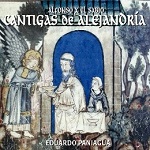 Eduardo
Paniagua and his team have already given us several selections from
the Cantigas de Santa Maria, a huge collection in the Galician
language assembled at the court of King Alfonso dubbed ‘the wise’.
All the songs relate to the Virgin Mary, enumerating miracles which
she performed or sins which she forgave. The cantigas are divided
into different sections but Paniagua’s selection here cuts across those
divisions, presenting seven works which mention Alexandria. In fact
only three of these cantigas refer directly to that place: No.155
describes how a sinful knight of that city turned to Mary, No.65 relates
to the saving of another sinner – a common theme – and No.145, here
in instrumental form only, describes John, the patriarch of Alexandria’s
devotion to Mary. There are no texts with the download but all the
cantigas are available
online, though without translation: type the CSM number of the work
that you are seeking into the box at top left.
Eduardo
Paniagua and his team have already given us several selections from
the Cantigas de Santa Maria, a huge collection in the Galician
language assembled at the court of King Alfonso dubbed ‘the wise’.
All the songs relate to the Virgin Mary, enumerating miracles which
she performed or sins which she forgave. The cantigas are divided
into different sections but Paniagua’s selection here cuts across those
divisions, presenting seven works which mention Alexandria. In fact
only three of these cantigas refer directly to that place: No.155
describes how a sinful knight of that city turned to Mary, No.65 relates
to the saving of another sinner – a common theme – and No.145, here
in instrumental form only, describes John, the patriarch of Alexandria’s
devotion to Mary. There are no texts with the download but all the
cantigas are available
online, though without translation: type the CSM number of the work
that you are seeking into the box at top left.
There’s no single right way to perform this music and recordings range
from the comparatively minimalist, as on the recent recording on the
PHI label (LPH017: Recording of the Month – review
– DL
News 2015/9) to Paniagua’s tendency to throw in lots of instrumentation.
There’s room for both schools of performance when both are so well done:
the court of Alfonso was comparatively open and enlightened for its
time, with Jewish and Arab influence, so it’s quite defensible for Paniagua
to rely on other Mediterranean musical practices.
Heinrich ISAAC (c.1450-1517)
Ave regina cælorum * (Reconstructed by Giuseppe Maletto) [4:17]
Ave ancilla trinitatis * [4:49]
Missa Misericordias Domini * [25:10]
Inviolata * (Anonymous, attrib. Isaac) [11:06]
Sub tuum praesidium [3:15]
Rogamus te [5:02]
Quae est ista * [6:48]
O decus Ecclesiæ [9:30]
Cantica Symphonia [Laura Fabris, Francesca Cassinari (sopranos); Giuseppe
Maletto, Gianluca Ferrarini, Fabio Furnari (tenors); Marco Scavazza
(baritone); Guido Magnano (organ); Svetlana Fomina, Efix Puleo, Daniela
Godio (fiddles), Ermes Giussani, David Yacus (sackbutts & slide
trumpets), Mauro Morini (sackbutt)]/Giuseppe Maletto
rec. 2009, 2010 and 2013.
* first recordings
Texts and translations included
GLOSSA GCDP31908 [69:57] – from eclassical.com
(mp3, 16- and 24-bit lossless, with pdf booklet)
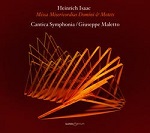
Heinrich Isaac is still something of a neglected composer. His music
mainly features as a side dish to his contemporaries, so it’s hardly
surprising that many of the works here, including the main item, the
Missa Misericordias Domini, are receiving their first recordings.
The quality of the music in these fine performances makes me hopeful
that we may have more such additions to the recorded repertoire, perhaps
from this same group, who have already done sterling service for Guillaume
Dufay – review.
A very fine supplement to the Tallis Scholars’ Isaac album, though that
should probably be your first port of call if you don’t yet own it.
(CDGIM023 – from gimell.com
or hyperion-records.co.uk,
both mp3 and lossless, with pdf booklet).
Roland de LASSUS (c.1531-1594)
Biographie Musicale Volume IV: La viellesse
Odhecaton/Paolo da Col
rec. Chiesa di S. Pietro, Belluno, Italy, April 2014. DDD
Texts and translations included in hardback presentation
MUSIQUE EN WALLONIE MEW1474 [73:54] – from eclassical.com
(mp3, 16- and 24-bit lossless, all with pdf booklet)
Biographie Musicale Volume V: Lassus l’Européen
Track listing after review
Vox Luminis/Lionel Meunier
rec. Église de Franc-Warêt, Belgium, February and May 2015. DDD
Texts and translations included in hardback presentation
MUSIQUE EN WALLONIE MEW1579 [60:40] – from Qobuz: stream
(for subscribers) or download
(mp3, 16- and 24-bit lossless) all with pdf booklet.
For full details please see my review.
Jan Pieterszoon SWEELINCK (1562 –1621) Works for Keyboard, Volume
3
Toccata C1, SwWV282/L19 [3:37]
Soll es sein (Poolse almande), SwWV330/N 12 [7:37]
Fantasia ‘Auf die Manier eines Echo’ C1, SwWV253/L13 [7:45]
Toccata 2di Toni g2, SwWV293/L22* [2:26]
Pavana Hispanica, SwWV327/N9* [2:47]
Fantasia [à 2] g3, SwWV272/L10* [1:10]
Toccata d1, SwWV285/L31 [3:26]
Ich fuhr mich über Rheine (Ick voer al over Rhijn), SwWV322/N4
[6:31]
Fantasia à 4 d2, SwWV259/L2 [11:13]
Toccata g4, SwWV295/L30 [2:08]
Malle Sijmen, SwWV323/N5 [1:35]
Fantasia d5, SwWV262/L37 [3:53]
Puer nobis nascitur, SwWV315/A8* [3:19]
Fantasia à 4 C2, SwWV254/L14* [5:21]
Allemande de chapelle, SwWV317* [3:06]
Fantasia re re re sol ut mi fa sol [à 2, 3 et 4 vocem] G4, SwWV269
[7:36]
Balleth del granduca, SwWV319/N1 [4:29]
Robert Woolley (harpsichord/virginal*)
Pitch: A = 415 Hz; Temperament: Quarter comma mean tone
rec. Glynde Church, East Sussex; 3–5 January 2008. DDD.
CHANDOS CHAN0811 [79:28] – from theclassicalshop.net
(mp3, 16- and 24-bit lossless with pdf booklet)
 All
three volumes in this series are now download only: some dealers still
have the discs of the earlier volumes but Volume 3 is released in that
format only from the start. Volumes 1 (CHAN0701 – from
theclassicalshop.net, mp3 and lossless, with pdf booklet) and 2
( CHAN0758 – review)
were both well received and though I recommend starting with Volume
1, a collection of organ music, I also enjoyed this new successor.
I’m only surprised that we had to wait so long for it and I hope that
we don’t have to wait as long again for what I hope will be further
volumes in the series. Sweelinck’s music may not have the general appeal
of the music of some of his better-known contemporaries but you would
hardly think that he was the organist of a Calvinist church. He was
not known as the ‘Orpheus of Amsterdam’ for nothing and his music is
well worth getting to know in these fine performances: scholarly, enjoyable,
well recorded and annotated. The 24-bit is at 44.1kHz but none the
worse for that.
All
three volumes in this series are now download only: some dealers still
have the discs of the earlier volumes but Volume 3 is released in that
format only from the start. Volumes 1 (CHAN0701 – from
theclassicalshop.net, mp3 and lossless, with pdf booklet) and 2
( CHAN0758 – review)
were both well received and though I recommend starting with Volume
1, a collection of organ music, I also enjoyed this new successor.
I’m only surprised that we had to wait so long for it and I hope that
we don’t have to wait as long again for what I hope will be further
volumes in the series. Sweelinck’s music may not have the general appeal
of the music of some of his better-known contemporaries but you would
hardly think that he was the organist of a Calvinist church. He was
not known as the ‘Orpheus of Amsterdam’ for nothing and his music is
well worth getting to know in these fine performances: scholarly, enjoyable,
well recorded and annotated. The 24-bit is at 44.1kHz but none the
worse for that.
Der Herr ist König - Baroque Bass Cantatas
Johann Theodor ROEMHILDT (1684-1756)
Nichts soll mich von Jesu scheiden (RoemV 217) [7:48]
Georg Philipp TELEMANN (1681-1767)
Sprich, treuer Himmel: ja! (TWV 11, 30) [10:26]
Christian WOLFF (1705-1773)
Ihr Sorgen laßet mich zufrieden [9:22]
LIEBHOLD (?-c1730)
Mein gantzes Wißen soll Jesus seÿn [13:53]
Christian WOLFF
Meines Bleibens ist nicht hier [11:05]
LIEBHOLD
Des Menschen Sohn ist kommen [10:07]
Georg Philipp TELEMANN
Der Herr ist König (TWV 7, 31) [11:13]
Klaus Mertens (bass-baritone)
Accademia Daniel/Shalev Ad-El
rec. 1-12 November 2010, Community Hall, Lutheran Trinitatiskirchgemeinde,
Chemnitz- Hilbersdorf, Germany. DDD
Texts and translations included
CPO 777646-2 [74:15] – stream
(for subscribers) or download
with pdf booklet from classicsonlinehd.com.
 A
delightful collection of North German cantatas for bass voice. As Johan
van Veen writes, there are no neglected masterpieces here – apart,
perhaps, from the closing Telemann work which gives its name to the
collection – but Klaus Mertens gives them the very best possible performance
and he is very well supported and recorded. The only blemish is the
small slip which JV notes – Geist for heist – but Mertens
gets that right second time round and we notice it only because his
diction is so spot-on.
A
delightful collection of North German cantatas for bass voice. As Johan
van Veen writes, there are no neglected masterpieces here – apart,
perhaps, from the closing Telemann work which gives its name to the
collection – but Klaus Mertens gives them the very best possible performance
and he is very well supported and recorded. The only blemish is the
small slip which JV notes – Geist for heist – but Mertens
gets that right second time round and we notice it only because his
diction is so spot-on.
There’s an earlier collection of Baroque Bass Cantatas from the same
collection preserved at Mügeln and performed by the same team on CPO
777298-2 [75:42] – download from eclassical.com;
subscribers can stream this from classicsonlinehd.com.
Neither provides the booklet, nor does Qobuz, though Naxos Music Library
offers the back cover only. The composers are Emanuel Kegel, Christian
Wolff, Johann Roemhildt (two cantatas), Hoffmann, Johann Donati and
Georg Philipp Telemann (attributed) – details
and review.
The lack of a booklet for the earlier collection is a serious blemish.
Connoisseurs of the vagaries of eighteenth-century German spelling will
have a field day reading the booklet which accompanies the new release.
I was slightly less enthusiastic about Mertens’ contribution to Ton
Koopman’s recording of Bach Funeral Cantatas – review
– but much more appreciative of two recordings of Graupner Bass Cantatas
from the same team as on the two CPO Baroque Bass Cantatas – DL
News 2014/8. For more of Mertens in Telemann, please see the Hänssler
recording below.
Georg Philipp TELEMANN (1681-1767) Festive Cantatas
Der Herr lebet (TWV 1, 284) [17:29]
Ehr und Dank sey Dir gesungen (TWV 1, 413) [18:33]
Der Geist giebt Zeugnis (TWV 1, 243) [21:42]
Miriam Feuersinger (soprano), Franz Vitzthum (alto), Klaus Mertens (bass-baritone)
Collegium vocale Siegen, Hannoversche Hofkapelle/Ulrich Stötzel
rec. 2014, Martinikirche, Siegen, Germany. DDD
Texts and translations included
HÄNSSLER CLASSIC CD98.047 [58:04] – from eclassical.com
(mp3 and lossless, with pdf booklet). Subscribers stream from classicsonlinehd.com.
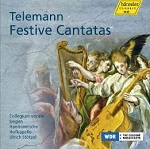
 ‘Three
very fine specimens of Telemann’s sacred music in splendid performances.’
Please see full
review by Johan van Veen.
‘Three
very fine specimens of Telemann’s sacred music in splendid performances.’
Please see full
review by Johan van Veen.
There’s very little to add to what JV writes. The slightly short value
results in a comparatively reduced price from eclassical.com – just
$10.39: at current exchange rates noticeably less than the £7.99 charged
by other download sites.
Six of Telemann’s less often performed secular cantatas have been recorded
by Klaus Mertens with Maria Jonas (soprano) and Les Amis de Philippe
conducted by Ludger Remy on CPO 777297-2 [77:22] – from eclassical.com
(mp3 and lossless). Once again Johan van Veen’s appreciative review
says it all, except that the download comes without the vital texts.
Recording of the Month
Johann Sebastian BACH (1685-1750) Lutheran Masses II
Mass in A, BWV234 [29:28]
Mass in F, BWV233 [23:52]
Marco Gioseppe PERANDA (1625-1675) Missa in a minor [16:43]
Hana Blažíková (soprano), Joanne Lunn (soprano), Aki Matsui (soprano),
Robin Blaze (counter-tenor), Yusuke Fujii (tenor), Gerd Türk (tenor),
Katsuhiko Nakashima (tenor), Dominik Wörner (bass), Peter Kooij (bass)
Bach Collegium Japan/Masaaki Suzuki
Rec. February 2014 (Bach) and February 2015 (Peranda), Kobe Shoin Women’s
Uinversity Chapel, Japan. DDD/DSD
Texts and translations included
BIS BIS-SACD-2121 [71:30] – from eclassical.com
(mp3, 16- and 24-bit lossless with pdf booklet)
 Bach
took two of my six choices for Recordings of the Year 2015
and it already looks as if he may do so again in 2016.
Bach
took two of my six choices for Recordings of the Year 2015
and it already looks as if he may do so again in 2016.
I used up all my superlatives about Suzuki’s Bach recordings for BIS
long ago: the church cantatas, completed a couple of years back, more
recently the secular cantatas, selected organ works and the first volume
of the short Lutheran Masses. Now he completes the series of short
Masses with BWV233 and 234, a highly competitive contribution even with
The Sixteen/Christophers (Coro), Pygmalion/Pichon (Alpha), Collegium
Vocale Ghent/Herreweghe (super-budget Erato/Virgin), Cantus Cölln/Junghänel
and Amsterdam Baroque Choir and Orchestra/Koopman (Challenge Classics)
in the field.
I hesitate to choose a winner among these but the unique selling point
of the new recording is the inclusion of the Kyrie and Gloria
of Peranda’s Mass in a minor, virtuoso music composed for the Dresden
court which Bach is now known to have performed as Kantor at Leipzig.
With excellent recording, especially in 24-bit (SACD also available)
and notes you could hardly go wrong with the new BIS recording.
George Frideric HANDEL (1685-1759)
Partenope, HWV27 (1730)
Karina Gauvin (soprano) – Partenope
Philippe Jaroussky (countertenor) – Arsace
Emöke Baráth (soprano) – Armindo
John Mark Ainsley (tenor) – Emilio
Teresa Iervolino (mezzo) – Rosmira
Luca Tittoto (bass) – Ormonte
Il Pomo d’Oro/Riccardo Minasi
rec. Lonigo, Italy, 16-28 February, 2015. DDD
Booklet with text and translations included
ERATO 2564609007 [74:31 + 62:48 + 66:07] – stream
(for subscribers) or download
from Qobuz (16- and 24-bit lossless, with pdf booklet)
Please see my full review.
NB: though I have given the links to Qobuz, their price for the 16-bit
download is slightly higher than you might expect to pay for the 3-CD
set and their 24-bit considerably more so. If you are happy with 320kb/s
mp3, with booklet, 7digital.com
offer the set for £12.49, but their price for lossless is, again, as
much as or more than you would pay for the CDs. The 16-bit download
of the Chandos recording, to which I have given links in the full review,
though less than you would pay for the CDs, is also marginally more
expensive than the Erato CDs.
George Frideric HANDEL (1685-1759)
Arie per la Cuzzoni : Arias for Francesca Cuzzoni (1691-1772)
Ouverture (Scipione) (1726) [5:55]
Marcia [1:26]
Che sento? Oh Dio! (Giulio Cesare) (1724) [1:09]
Se pietà di me non senti [7:39]
Scoglio d’immota fronde (Scipione) [5:22]
Concerto (Ottone) (1723) [2:44]
Ombre, piante, urne funeste! (Rodelinda) (1725) [5:26]
Non credo che sian finti (Siroe, Re di Persia) (1728)
[0:27]
Or mi perdo di speranza [4:34]
Non è più tempo (Tamerlano) (1724) [2:53]
Ouverture (Tolomeo, Re di Egitto) (1728) [3:27]
Ballo di Larve (Admeto) (1727) [2:48]
Sinfonia (Scipione) [1:29]
Sinfonia (Admeto) [1:20]
È tale Otton? (Ottone) [1:17]
Falsa imagine [6:01]
Se’l mio duol non è si forte (Rodelinda) [5:46]
Sinfonia (Admeto) [1:17]
Nò, più soffrir non voglio (Alessandro) (1726) [3:58]
Torni omai la pace all’alma (Tolomeo, Re di Egitto) [4:17]
Hasnaa Bennani (soprano)
Les Muffatti/Peter van Heyghen
rec. February, 2015, Begijnhofkerk, Sint-Truiden, Belgium. DDD.
texts and translations included
RAMÉE RAM1501 [69:27] Reviewed as mp3 press preview from Outhere.
Subscribers stream
from Qobuz. Download from Qobuz
(16- and 24-bit lossless with pdf booklet).
Arias for Cuzzoni
Rodelinda: Spietati [4:17]
Ombre, piante, urne funeste! [4:46]
Riccardo Primo: Il volo cosi fido [5:10]
Giulio Cesare: Se pietà di me non senti [10:56]
Piangerò la sorte mia [6:03]
Da tempeste il legno infranto [6:17]
Scipione: Scoglio d’immota fronte [5:27]
Ottone: False imagine [7:17]
Affanni del pensier [7:34]
Tamerlano: Se non mi vuol amar [7:14]
Alessandro: L’amor che per te sento [4:42]
Flavio: Amante stravagante [4:24]
Lisa Saffer (soprano)
Philharmonia Baroque Orchestra/Nicholas McGegan
rec. c.1990. DDD
HARMONIA MUNDI HMU907036 [74:07] – from eclassical.com
(mp3 and lossless, NO booklet)

 The
temperamental Francesca Cuzzoni was Handel’s prima donna in the 1720s,
for whom he created several major roles.
The
temperamental Francesca Cuzzoni was Handel’s prima donna in the 1720s,
for whom he created several major roles.
The Harmonia Mundi is download only and without booklet. Lisa Saffer
captures the technique which Cuzzoni possessed, without quite matching
her reported ability also to ‘render pathetic whatever she sang’ as
Dr Burney put it. With very good support and recording, only the lack
of texts presents a major problem. Price is problematic, too: considering
that this was recently available in a 4-CD super-budget set*, for UK£
purchasers the eclassical.com price of $16.68 will be less attractive
than £7.99 (mp3) and £9.99 (lossless) from prestoclassical.co.uk.
Johan van Veen was less than delighted with Hasnaa Bennani on a recent
Muso recording of Rameau, disliking her over-wide vibrato and lack of
dramatic involvement – review
– but I liked the Alpha recording of Clérambault and Couperin music
for Holy Week on which she features as one of the soloists – DL
News 2015/3.
On the new Handel recording, too, she employs a fairly wide vibrato
and her timbre sometimes sounds more like a mezzo. I didn’t find either
of these too much of a problem and only about half of each programme
overlaps with the other. Some of the arias are not otherwise represented
in the current UK catalogue. Where there are alternatives, however,
I tend to prefer them, as in the case of No, più soffrir non voglio
which Sandrine Piau includes on a recent budget-price 2-CD conflation
of two earlier Handel recitals (Naïve NC40037). As Göran Forlsing
writes,
Piau sings this with élan. ForOmbre piante, it’s Piau
again or Emma Bell (Linn BKD252 – review
of earlier release).
Several of the arias on the Ramée and Harmonia Mundi releases are also
included on an inexpensive 3-CD download from Hyperion
(Emma Kirkby and Catherine Bott:CDS44271/3 – Bargain of the Month
review).
The download costs just £15 but I’m surprised to see that the CDs can
be obtained only from the Archive Service because that would still be
my top recommendation for anyone seeking a first-rate collection of
Handel arias.
The orchestral support on the new Ramée album is good, as is the recording
quality, even in the mp3 version which I received for review: at around
256kb/s that’s in line with what you would get from iTunes or Amazon,
albeit that they have it without the useful pdf booklet. Qobuz offer
the booklet with their streamed
version (for subscribers) and download
(16- and 24-bit lossless).
Jonathan Woolf was mainly pleased with a third set of arias for Cuzzoni
from Simone Kermes (Berlin Classics) – review.
* Amazon
UK still have a few copies at £18.28.
Wilhelm Friedemann BACH (1710-1784)
Harpsichord Concerto in a minor, F45 [14:23]
Sinfonia in F major, F67 ‘Dissonant’ [14:32]
Harpsichord Concerto in D, F41 [16:14]
Allegro e forte (Sinfonia in d minor), F65 [4:59]
Harpsichord Concerto in e minor, F43 [23:19]
Maude Gratton (harpsichord)
Il Convito
rec. Église de Xaintrailles, May 2012. DDD
MIRARE MIR162 [73:27] – from eclassical.com
(mp3, 16- and 24-bit lossless with pdf booklet)
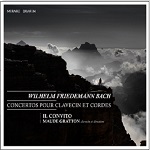 ‘All
in all one of the very happy surprises on my desk this year’: see review
by Jens F Laurson.
‘All
in all one of the very happy surprises on my desk this year’: see review
by Jens F Laurson.
It’s not the fault of the record companies if we have allowed WF’s music
to be overshadowed by that of his father and brothers – I was surprised
to see that there are over 100 CDs of his music in the current catalogue,
so why are we not buying them? It’s our own fault that we haven’t listened
to them, but recently Giovanni Alessandrini and Il Giardino Armonico
slipped one of his Sinfonias into one of their albums of Haydn and his
contemporaries. Unfortunately, it’s the same remarkable work that is
recorded here, F67. (ALPHA671 – review).
That Sinfonia is also included on a Harmonia Mundi collection (HMC901772
Akademie für alte Musik – from eclassical.com,
mp3 and lossless). Nonetheless, there’s enough other music here, all
very well performed and recorded, to make the whole well worth having.
The Parisian Symphony
Jodie Devos, Sophie Karthäuser (soprano), Jennifer Borghi (mezzo), Jean-Paul
Madeuf (keyed trumpet), Jan De Winne (transverse flute), Benoît Laurent
(oboe), Eric Hoeprich, Guy Van Waas (clarinet), Jane Gower (bassoon),
Patrick Cohën-Akenine (violin), François Poly (cello)
Les Agrémens/Guy Van Waas
rec. 2002 - 2014
 RICERCAR
RIC357 [7 CDs: 510:12]
RICERCAR
RIC357 [7 CDs: 510:12]
Johan van Veen has reviewed
the 7-CD set in detail and in terms with which I largely agree. I have
listened only to the mp3 press preview from Outhere, which is at 192
kb/s, lower even than the iTunes and Amazon downloads, but adequate
– I reviewed
it with other recent Outhere releases.
The press preview comes with a useful 102-page pdf booklet which you
won’t find with the download versions from iTunes or Amazon. Subscribers
can stream
the set from Qobuz and it can be purchased
for download for £16.79, around half the cost of the 7-CD set and
complete with the said booklet.
Great Cello Concertos
William WALTON (1902-1983) Cello Concerto [28:48]
Gregor Piatigorsky (cello); Boston Symphony Orchestra/Charles Munch
– rec.1957 ADD/mono
Antonín DVOŘÁK (1841-1904) Cello Concerto No.2 in
b minor, Op.104 [39:15]
Mstislav Rostropovich (cello); Czech Philharmonic Orchestra/Václav Talich
– rec.1952. ADD/mono
Joseph HAYDN (1732-1809) Cello Concerto in D, Op.101, Hob.VIIb/2
[26:06]
Maurice Gendron (cello); Lamoureux Orchestra/Pablo Casals – rec. 1960
ADD/stereo
BEULAH 1PDR21 [94:10] – from iTunes
(mp3) or
stream (for subscribers) or download
from Qobuz.
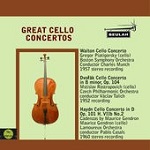 Three
classic cello concerto recordings brought together as a download album
longer than any CD: what’s not to like? Well, I would have preferred
the reverse order of playing but that’s about it.
Three
classic cello concerto recordings brought together as a download album
longer than any CD: what’s not to like? Well, I would have preferred
the reverse order of playing but that’s about it.
The Gendron Haydn was originally released coupled with the Boccherini
B-flat Cello Concerto on Philips SABL188 – the first recording of that
work in its original form rather than the Grützmacher arrangement –
but the Haydn was just as noteworthy and this recording has resurfaced
over the years in various couplings, though neither the Philips Concert
Classics CD which I own nor the Decca box set, L’Art de Maurice Gendron,
on both of which it was coupled with an equally fine performance of
the then recently rediscovered Concerto in C, is currently available.
With the great cellist Casals directing his distinguished successor,
for this alone the Beulah reissue would be invaluable. The transfer
is only a shade less truthful than the deleted Philips CD.
If you seem to be experiencing déjà-vu, it’s because I’ve already
praised this transfer of the Haydn on 1BX146-3BX146 in DL News
2012/23. It’s better value as part of the new album.
It would be too much to expect hi-fi sound from the Dvořák, recorded
in mono in 1952 by Supraphon, not exactly renowned then for the latest
recording techniques. This classic performance, however, would be worth
hearing even with over a hundred current rivals and even if the sound
were infinitely worse than the very creditable Beulah transfer. Rostropovich
recorded the work again with several other conductors but Talich was
an interpreter beyond compare of Czech music. There is a highly recommendable
super-budget Regis transfer, coupled with the Piano Concerto (RRC1368:
Bargain of the Month – review
– review
– DL
Roundup April 2011/1) but cello connoisseurs may well prefer the
Beulah coupling. I recently praised the Beulah transfer of the Talich
Má Vlast; if anything, this is even better.
This recording of the Walton is also special: it was the first recording
available in the UK and, with the cellist who commissioned it performing,
it still sets the benchmark for all other recorded versions. It’s a
work which was slow to impinge on the musical consciousness but it has
surely established itself now. As I recall, the sound on the RCA stereo
LP (LSB4101) was dry and thin but the Beulah transfer is a great improvement.
The cello is rather too prominently balanced but there was nothing that
could be done about that; otherwise there’s little to choose between
the Beulah transfer and that on the super-budget set with the Violin
and Viola Concertos and Symphony No.1 (74321925752 – review
– review).
That’s a very desirable twofer but even if you already have it the Beulah
is well worth having for the other concertos.
My review files came in lossless wav format. The Qobuz downloads are
also available in several lossless formats but the iTunes equivalents,
at the same price, are mp3 only and are likely to be at only 256kb/s
so, while Qobuz continues to hold its head above water, that is the
better option for this and all Beulah downloads.
Sir John Barbirolli Symphonies Volume 1
Ludwig van BEETHOVEN (1770-1827) Symphony No.1 in C, Op.21 [25:07]
Gustav MAHLER (1860-1911) Symphony No.1 in D [51:34]
Hallé Orchestra/Sir John Barbirolli – rec. 1958 and 1957 ADD/stereo
BEULAH 1PDR17 [76:41] – from iTunes
(mp3) or Qobuz (lossless) – stream
(for subscribers) or download.
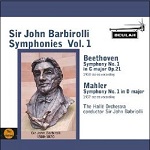 Barbirolli’s
recorded legacy shines brightest in the likes of Bax, Elgar and Vaughan
Williams, not all of it currently available. A Beulah reissue of his
Pye recording of the VW London Symphony, for example, would not
come amiss though it’s available from the Barbirolli Society.
Barbirolli’s
recorded legacy shines brightest in the likes of Bax, Elgar and Vaughan
Williams, not all of it currently available. A Beulah reissue of his
Pye recording of the VW London Symphony, for example, would not
come amiss though it’s available from the Barbirolli Society.
The Beethoven Symphony receives an attractive performance, also available
from the Barbirolli Society, though it’s hardly outstanding among the
many available recordings of the work.
It’s the from other end of Mahler’s symphonic output that Barbirolli
is best known – I regard his recording of the Ninth Symphony with the
Berlin Philharmonic as a benchmark – but this Free Trade Hall recording
of the First, from a time when there was far less choice of Mahler symphonies,
is well worth hearing. It was set down a couple of years after Barbirolli
had stunned the Manchester audience with a performance of the work designed
to outdo his great rival Beecham, who had appeared there with the RPO
a few weeks earlier. This recording, as reissued by the Barbirolli
Society, holds a well-deserved place in Tony
Duggan’s Synoptic Survey but the Beulah reissue is less expensive
and many will prefer the coupling here to the Purcell pastiche on that
release.
The orchestral playing may not be of the best – even in the opening
movement, one of the most magical accounts that I have heard – the odd
phrase is slurred and the second movement may be a little too deliberate
and sentimental for the kräftig bewegt marking*, but I was surprised
overall to hear the extent to which this recording challenges my all-time
top recommendation from Rafael Kubelík (DG Originals 4497352,
with Dietrich Fischer-Dieskau in Lieder eines fahrenden Gesellen).
When the Beethoven was released in stereo (Pye CSCL70001, with Symphony
No.8), the sound was decried as inferior tonally to the earlier mono
LP. The Mahler was originally released in mono only, with stereo appearing
for the first time a decade later on Pye Golden Guinea GSGC14074**,
by which time stereo LPs had fully established themselves and the recording
was deemed ‘pretty good for its age’, albeit with some of the surface
noise – even a few bumps – to which Golden Guineas often seemed to be
addicted. Beulah’s refurbishment has worked its accustomed magic with
both.
* Barbirolli perhaps takes more note of the added doch nicht zu schnell.
** Which appears to negate the Barbirolli Society assertion that the
transfer on SJB1015 is the first time that the stereo has appeared.
Felix MENDELSSOHN (1809-1847)
Mendelssohn in Birmingham, Volume 4
Violin Concerto in e minor, Op.64* [27:56]
A Midsummer Night’s Dream, incidental music, Op.61** [39:44]
Jennifer Pike (violin)*
Rhian Lois, Keri Fuge (soprano)**
CBSO Youth Chorus**
City of Birmingham Symphony Orchestra/Edward Gardner
rec. Town Hall, Birmingham, 13 and 14 July 2015. DDD/DSD
CHANDOS CHAN5161 [67:57] – from theclassicalshop.net
(mp3, 16- and 24-bit lossless, with pdf booklet)
Also available as hybrid SACD CHSA5161.
Das Märchen von der Schönen Melusine (The Fair Melusine) Op.32
[9:47]
A Midsummer Night’s Dream, Incidental Music, Op.61 [49:26]
The Hebrides, Op.26 [8:51)
Camilla Tilling (soprano), Magdalena Risberg (soprano)
Swedish Radio Choir (women’s voices)
Swedish Chamber Orchestra/Thomas Dausgaard
rec. September 2014, Concert Hall of the School of Music, Theatre and
Art, Örebro, Sweden
BIS BIS-SACD-2166 [69:06] – from eclassical.com
(mp3, 16- and 24-bit lossless, with pdf booklet).
Please see hybrid SACD review
by Gwyn Parry-Jones: ‘this CD is stuffed with wonderful things.’

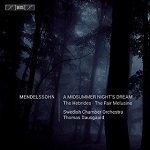 It’s
the London bus syndrome again, with recordings coming in bunches like
bananas. As Chandos’s Mendelssohn series draws to a conclusion is BIS
about to begin one, with Dausgaard and his smaller forces doing what
they have already done in the ‘Opening Doors’ series?
It’s
the London bus syndrome again, with recordings coming in bunches like
bananas. As Chandos’s Mendelssohn series draws to a conclusion is BIS
about to begin one, with Dausgaard and his smaller forces doing what
they have already done in the ‘Opening Doors’ series?
As GP-J writes, the BIS recording is mostly highly desirable, apart
from a slightly rushed tempo for The Hebrides, and even there
the effect is in keeping with the refreshing qualities of the performances
rather than off-putting. The recording is excellent in 24/96 garb but
more than acceptable even in the less expensive mp3 and 16-bit lossless
formats.
I would have expected Chandos already to have had at least one other
recording of both the Violin Concerto and the Dream music but
only the ubiquitous Wedding March seems to be otherwise on offer, on
a desirable super-budget-price Introduction which includes Symphony
No.4, Piano Concerto No.1 and The Hebrides (CHAN2025).
Jennifer Pike is already a veteran in the concerto: she launched her
career with it thirteen years ago when she became Young Musician of
the Year aged 12. John Leeman on our sister site Seen and Heard greatly
enjoyed her performance with the London Mozart Players – review
– writing that it was characterised by the most beautiful tone that
he had heard since Menuhin. When he wrote that in September 2015 the
recording with the CBSO had already been a couple of months in the can
but the same comments apply. If you don’t yet have a good recording
of the Violin Concerto – and even if you have, as most music-lovers
must – this must go very close to the top of the pile.
Much of the success of this recording must be ascribed to the accompaniment
of the CBSO and Edward Gardner, the constants throughout this Mendelssohn
in Birmingham series. I see that Pike performed the concerto, again
with the CBSO but with a different conductor, in Lichfield Cathedral
at about the same time that the recording was set down, a performance
in which the Birmingham Post judged the ‘stolid’ accompaniment
less than ideal. In the Dream music, too, Gardner’s direction
is very convincing. There’s slightly less of the music here than on
BIS but nothing essential is omitted. There’s very little to choose
between these two albums, so preference of coupling could be the deciding
factor. Both come with excellent sets of notes and both are very well
recorded, with 24-bit and SACD on offer. I had problems downloading
some tracks of the 24-bit Chandos but the 16-bit and mp3 are very good
of their kind.
Johannes BRAHMS (1833-1897) Violin Concerto in D, Op.77* [38:29]
Bela BARTÓK (1881-1945) Violin Concerto, Op. posth., Sz 36,
BB48A** [20:26]
Janine Jansen (violin)
* Santa Cecilia Orchestra; ** London Symphony Orchestra/Anthony Pappano
rec. live * Santa Cecilia Hall, Rome, February 2015; ** Walthamstow
Assembly Hall, London, August 2015.
DECCA 4788412 [58:55] – stream
(for subscribers) or download from Qobuz (16- and 24-bit lossless, with pdf booklet).
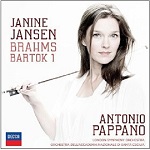 Though
this recording has already received the highest praise in some quarters
and though the solo playing, orchestral support in both Rome and London
and recording are excellent, the Brahms just won’t do for me or, I suspect,
anyone else who first cut their musical teeth on the 1959 classic Heifetz
and Reiner recording. That’s still my first choice, even though the
single-CD releases, with the Double Concerto (RCA 82876594102)
or with Tchaikovsky (09026614952) are now download only. Otherwise
it’s part of a budget-price 6-CD box set (88697761382) which
also contains some other fine performances, such as the Beethoven (with
Munch) and Tchaikovsky (Reiner again).
Though
this recording has already received the highest praise in some quarters
and though the solo playing, orchestral support in both Rome and London
and recording are excellent, the Brahms just won’t do for me or, I suspect,
anyone else who first cut their musical teeth on the 1959 classic Heifetz
and Reiner recording. That’s still my first choice, even though the
single-CD releases, with the Double Concerto (RCA 82876594102)
or with Tchaikovsky (09026614952) are now download only. Otherwise
it’s part of a budget-price 6-CD box set (88697761382) which
also contains some other fine performances, such as the Beethoven (with
Munch) and Tchaikovsky (Reiner again).
By comparison Jansen and Pappano take over half the time of the complete
work (22:12) in a performance of the first movement which, beautiful
as it is, is simply too slow overall and especially so in places where
they linger to admire the scenery. It’s a common problem in recordings
of this work, but it means that we are effectively listening to two
slow movements whereas at 18:54 Heifetz and Reiner keep the music moving.
After that it seems superfluous to praise the rest of the Brahms and
the Bartók, but I do recommend sampling this for yourself if you can.
A further word of caution: the CD is currently selling for as little
as £10.50, reduced from a regular £11.75, so the Qobuz 16-bit download
at £11.56 is somewhat pricey, though the 24-bit at £15.56 may be worth
the extra.
Modest MUSSORGSKY (1839-1881)
Pictures at an Exhibition (1874/1922) (orch. Ravel) [34:43]
Royal Concertgebouw Orchestra/Mariss Jansons
rec. live, 22 & 23 May 2008, Concertgebouw, Amsterdam
Pdf booklet included
RCO LIVE RCO09004 SACD [34:43] – from eClassical
(mp3, 16- & 24-bit lossless)
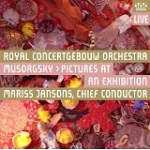 Mariss
Jansons, who stepped down as chief conductor of the Concertgebouw in
2015, is no stranger to this piece; he’s recorded it with the Oslo Philharmonic,
where he was music director from 1979 to 2000 and, most recently, with
the Bavarian RSO, which he has led since 2003/4. Michael Cookson praised
the latter performance, both musically and technically (review).
Perhaps that’s just as well, for this RCO Live version is a mess. For
a start I’m surprised the company decided to issue this piece on a disc
all by itself; both the Oslo and Munich recordings have substantial
fillers. As if that weren’t cheeky enough the SACD is offered at around
£11; at least eClassical’s per-second charging model makes the download
more reasonable (£6.30).
Mariss
Jansons, who stepped down as chief conductor of the Concertgebouw in
2015, is no stranger to this piece; he’s recorded it with the Oslo Philharmonic,
where he was music director from 1979 to 2000 and, most recently, with
the Bavarian RSO, which he has led since 2003/4. Michael Cookson praised
the latter performance, both musically and technically (review).
Perhaps that’s just as well, for this RCO Live version is a mess. For
a start I’m surprised the company decided to issue this piece on a disc
all by itself; both the Oslo and Munich recordings have substantial
fillers. As if that weren’t cheeky enough the SACD is offered at around
£11; at least eClassical’s per-second charging model makes the download
more reasonable (£6.30).
Now that would be fair value if the performance and recording weren’t
so disappointing. I’ve often felt that, for all his virtues, Jansons
micro-manages his players. I first noticed it in his Oslo Tchaikovsky
cycle (Chandos), but that set does contain some terrific performances.
I’m afraid he’s at his worst in this 2008 Pictures, tugging the
music about and fiddling with dynamics in the most unsubtle and unmusical
way. Not only that, the Concertgebouw are not at their usual best; ditto
Polyhymnia, who’ve come up with a remarkably dull recording.
And just when you think it can’t get any worse, it does. The last notes
of The Great Gate of Kiev are brutally faded, as if in a vain
attempt to forestall any applause. I’ve no idea if this is repeated
on the disc, but I can’t believe that Polyhymnia – who normally do such
fine work for RCO Live and Pentatone – would have allowed this to pass.
Whatever the story this download is one of the worst I’ve encountered
in ages. Given the wayward performance, disappointing sonics and poor
presentation this download is a waste of money at any price.
A dud; avoid at all costs.
Dan Morgan
Pyotr Ilyich TCHAIKOVSKY (1840-1893)
Piano Trio in a minor, Op.50 [44:27]
Bedrich SMETANA (1824-1884)
Piano Trio in g minor, Op.15 [29:42]
Trio con brio Copenhagen
ORCHID CLASSICS ORC100051 [74:09] – from eclassical.com
(mp3 and lossless with pdf booklet)
 There
are over 60 recordings of the Tchaikovsky Piano Trio and many of them
set the benchmark very high. So high, indeed, that I was lukewarm about
recordings by the Petrof Trio (Nimbus) and Evrus Trio (Fontenay), though
both have considerable virtues – review.
There
are over 60 recordings of the Tchaikovsky Piano Trio and many of them
set the benchmark very high. So high, indeed, that I was lukewarm about
recordings by the Petrof Trio (Nimbus) and Evrus Trio (Fontenay), though
both have considerable virtues – review.
The lengthy opening movement sets the tone for the rest of the work
and it’s important to get the balance right here between passion, wistfulness
and lyricism and for me both those recordings lean a little too much
to the lyrical. You might expect a group entitled Trio con Brio to
be a little too far on the cheerful side, too, and that is how it transpires,
with the drama a little subdued. It’s beautifully played and will appeal
to those who like the music more rhapsodic; I liked it more on repeated
hearing. Similarly, I thought there was marginally too little contrast
between the different variations which follow, leaving me still in favour
of Trio Wanderer with the very similar Arensky Trio (Harmonia Mundi
HMC902161 – review
–
Download News 2014/4 – DJB’s
Piano Trio Survey) among recent accounts of this work, alongside
the Ashkenazy Trio as a budget-price recommendation, also with Arensky
(Naxos 8.550467). Among older recordings that by the Kempf Trio
is also worth considering, especially if the Rachmaninov coupling appeals
(BIS-CD-1302 –
review: download from eclassical.com,
mp3, 16- and 24-bit lossless, with pdf booklet).
Recording of the Month
Enrique GRANADOS (1867-1916)
Goyescas (1909-1911) [50:37]
Escenas poéticas (publ.1912/16) [17:10]
Intermezzo de la Ópera Goyescas (1916) [3:53]
El pelele (Escena goyesca) (1914) [4:18]
Joop Celis (piano)
rec. July 2014, Willem Hijstek zaal, Conservatorium Maastricht, The
Netherlands
Pdf booklet included
BIS BIS-2122 SACD [77:09] – from eClassical
(mp3, 16- & 24-bit lossless)
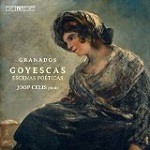 Alicia
de Larrocha’s various accounts of Goyescas (Warner,
Decca and RCA)
are indispensable, but there are other pianists who have something useful
to say about this music. Among them is the American Garrick
Ohlsson, who now records for Hyperion. I praised him for his ‘exemplary
musicianship’, although I noted his playing seemed ‘long on technique,
but a little short on temperament’. With hindsight that may have been
a little harsh, but then the Dutchman Joop Celis’s performance captivates
me in a way that Ohlsson’s doesn’t. Both are very well recorded – Hyperion
and BIS are class leaders in this respect – so I’ve no quibbles about
the sound on either album.
Alicia
de Larrocha’s various accounts of Goyescas (Warner,
Decca and RCA)
are indispensable, but there are other pianists who have something useful
to say about this music. Among them is the American Garrick
Ohlsson, who now records for Hyperion. I praised him for his ‘exemplary
musicianship’, although I noted his playing seemed ‘long on technique,
but a little short on temperament’. With hindsight that may have been
a little harsh, but then the Dutchman Joop Celis’s performance captivates
me in a way that Ohlsson’s doesn’t. Both are very well recorded – Hyperion
and BIS are class leaders in this respect – so I’ve no quibbles about
the sound on either album.
Goyescas surely represents the pinnacle of Granados’s musical
career, which was cut short when the passenger ferry on which he was
travelling to Dieppe was torpedoed by a German U-boat in March 1916.
The range of colour and the rhythmic subtlety on display in this new
recording is just astonishing; indeed, Celis shapes and calibrates each
of the work’s six movements with uncommon authority and skill. His dynamic
shading is pure joy and the recording – engineered by Take5’s Marion
Schwebel – has a glow and presence that’s just ravishing. Celis’s accounts
of Escenas poéticas, the intermezzo from Granados’s opera Goyescas
and El pelele are just as revelatory.
I listened to this collection over several days, and each time Celis
revealed something new; a lovely turn of phase, a twist of rhythm or
a splash of colour. As if that weren’t enough there’s a profound humanity
to Celis’s playing that’s deeply affecting. In the preamble to my Recordings
of the Year 2015 I commented on the number of fine piano recordings
that had come my way in the previous 12 months. If Celis’s Granados
is a harbinger of things to come then 2016 should be every bit as enthralling.
Incidentally, the splendid liner-notes are by Walter Aaron Clark, author
of Granados: Poet of the Piano.
Very, very distinguished playing and a fabulous recording; where’s this
pianist been hiding all these years?
Dan Morgan
Enrique GRANADOS (1867-1916)
Piano Quintet in g minor Op.49 [15:55]
Joaquín TURINA (1882-1949)
Piano Quintet in g minor Op.1 [30:53]
Caliope (Hymn from Las musas de Andalucia Op.93/9) [4:26]
Javier Perianes (piano ); Cuarteto Quiroga (Aitor Hevia, Cibrán Sierra
[violin], Josep Puchades [viola], Helena Poggio [violoncello])
rec. Teldex Studio Berlin, February and March 2015. DDD
HARMONIA MUNDI HMC902226 [51:14] – from eclassical.com
(mp3, 16- and 24-bit lossless, with pdf booklet). Subscribers sample
from Qobuz
 Two
masterpieces awaiting discovery, as the publicity blurb puts it? Not
quite that, perhaps. Neither quintet is typical of its composer and,
as for discovery, there have been recordings of both – four of each
in the current catalogue – though never, I think, together. The performances
and recording, especially in 24-bit format, make a strong case for them
and like Jonathan Woolf – review
– I enjoyed this recording.
Two
masterpieces awaiting discovery, as the publicity blurb puts it? Not
quite that, perhaps. Neither quintet is typical of its composer and,
as for discovery, there have been recordings of both – four of each
in the current catalogue – though never, I think, together. The performances
and recording, especially in 24-bit format, make a strong case for them
and like Jonathan Woolf – review
– I enjoyed this recording.
The rather short playing time brings a compensating reduction in price
from eclassical.com: at the time of writing the 24-bit was on offer
for the same price as the mp3 and 16-bit, $13.83. After the initial
offer expect the 24-bit to cost about 50% extra. Subscribers can sample
from classicsonlinehd.com
but their download price (for 16-bit only) is rather steep at £12.24
– more than the cost of the CD (£11.75 from Presto).
Reissue of the Month
Percy GRAINGER (1882-1961)
Country Gardens [2:15]
Shepherd’s Hey [2:07]
Colonial Song [6:03]
Children’s March ‘Over the Hills and far away [4:12]
Immovable Do [4:26]
Mock Morris [3:37]
Handel in the Strand [4:19]
Irish Tune from County Derry [3:35]
Spoon River [4:04]
My Robin is to the Greenwood gone [4:09]
Molly on the Shore [4:18]
Eastman-Rochester Pops Orchestra/Frederick Fennell – rec. 1959. ADD/stereo
Fredrick DELIUS (1861-1934)
Over the Hills and far away [12:58]
Summer Night on the River [6:38]
Royal Philharmonic Orchestra/Sir Thomas Beecham – rec. 1957. ADD/stereo
Brigg Fair [14:44]
Philadelphia Orchestra/Eugene Ormandy – rec. 1962. ADD/stereo
BEULAH 9PD82 [77:25] – from iTunes
(mp3)
 Both
halves of this release are very desirable. Some time ago I recommended
a Chandos sampler from their recordings of Grainger’s music led by Richard
Hickox as a very fine and inexpensive introduction (CHAN2029,
around £5 on CD: download no longer seems to be available from Chandos
– Qobuz and 7digital downloads, without booklet, are more expensive
than the CD). Now it’s an even bet whether that or this very similar
Beulah selection represents the better value. As they are inexpensive,
I’d go for both.
Both
halves of this release are very desirable. Some time ago I recommended
a Chandos sampler from their recordings of Grainger’s music led by Richard
Hickox as a very fine and inexpensive introduction (CHAN2029,
around £5 on CD: download no longer seems to be available from Chandos
– Qobuz and 7digital downloads, without booklet, are more expensive
than the CD). Now it’s an even bet whether that or this very similar
Beulah selection represents the better value. As they are inexpensive,
I’d go for both.
The cream on top of the Beulah release comes in the form of three pieces
by Delius who, as the title reminds us, befriended Grainger – remember
the latter’s leap from the bushes at Grez in the Ken Russell film on
Delius? The two Beecham items supplement his stereo Delius recordings
on Beulah 3PDR4 (Recording of the Month – DL News
2015/11) and Ormandy’s Brigg Fair reminds us that he, too, was
a very fine interpreter of his music. All the recordings have been
very well transferred.
Don’t be misled by the peaceful pastoral scene on the cover: neither
Grainger nor Delius ever belonged to the ‘English cow-pat school’ if
ever there was such a thing.
Charles IVES (1874-1954)
Symphony No.4 (ed. T. Brodhead)* [31:11]
The Unanswered Question (revised version)** [6:54]
Central Park in the Dark [11:52]
Symphony No.3 in B-flat ‘The Camp Meeting’ [22:18]
* Cristina Valdés (piano); Joseph Adam (organ); Stilian Kirov, David
Alexander Rahbee, Julia Tai (assistant conductors)
** David Gordon (trumpet)
Seattle Symphony Chorale,
Seattle Symphony Orchestra/Ludovic Morlot
rec. S. Mark Taper Foundation Auditorium, Benaroya Hall, Seattle, Washington,
live in concert; 29 and 31January 2015 (Symphony No.4); 26 September,
2014 and April 3, 2015 (Central Park and The Unanswered Question); 14
May, 2014, 9, 10 and 26 September 2014 and 3 April 3 2015 (Symphony
No.3).
SEATTLE SYMPHONY MEDIA SSM1009 [71:41] – from eclassical.com
(mp3, 16- and 24-bit lossless, with pdf booklet).
 I
thought that Ives’s characteristic blend of discord and apple pie harmony
had lost its power to surprise me by now but this recording of Symphony
No.4 proves that it still has the power to disturb, from the challenging
opening through to the peaceful conclusion. It’s presented here in
the recent critical edition of the score, as recorded live on two occasions,
with three assistant conductors helping Ludovic Morlot to hold the whole
vast assemblage together. On the Hyperion recording with the Dallas
SO and Andrew Litton (CDA67540) it’s a culture shock to hear
the Fourth immediately after the First, an enjoyable work but firmly
in the European symphonic tradition. On the Seattle recording the shock
comes right at the beginning of the programme. I’m still inclined marginally
to prefer the Hyperion but that’s not available to download and the
coupling of the new recording presents four of Ives’s major works.
Stocks of the Hyperion SACD are now exhausted, though a few remain of
Volume 2, Symphonies Nos. 2 and 3 (SACDA67525 – see Hyperion:
The Last Few SACDS), so the Seattle recording is the only Fourth
now available in 24-bit sound. For contractual reasons the Hyperion
recordings are not available to download and it appears that the Seattle
recording will be download only in the UK.
I
thought that Ives’s characteristic blend of discord and apple pie harmony
had lost its power to surprise me by now but this recording of Symphony
No.4 proves that it still has the power to disturb, from the challenging
opening through to the peaceful conclusion. It’s presented here in
the recent critical edition of the score, as recorded live on two occasions,
with three assistant conductors helping Ludovic Morlot to hold the whole
vast assemblage together. On the Hyperion recording with the Dallas
SO and Andrew Litton (CDA67540) it’s a culture shock to hear
the Fourth immediately after the First, an enjoyable work but firmly
in the European symphonic tradition. On the Seattle recording the shock
comes right at the beginning of the programme. I’m still inclined marginally
to prefer the Hyperion but that’s not available to download and the
coupling of the new recording presents four of Ives’s major works.
Stocks of the Hyperion SACD are now exhausted, though a few remain of
Volume 2, Symphonies Nos. 2 and 3 (SACDA67525 – see Hyperion:
The Last Few SACDS), so the Seattle recording is the only Fourth
now available in 24-bit sound. For contractual reasons the Hyperion
recordings are not available to download and it appears that the Seattle
recording will be download only in the UK.
The LPO/Serebrier recording of the Fourth Symphony (Chandos CHAN8397,
download only) is really uncompetitive by comparison with Litton and
Morlot: the opening of the first movement lacks all challenge and the
playing-time of 33 minutes just won’t do for a full-price release.
The Fourth Symphony is the major reason for buying this new recording
but it comes with equally fine performances of the other works. The
24-bit download is very good and comes with a booklet containing useful
analyses of the music.
Charles IVES
A Symphony: New England Holidays [39:04]
Central Park in the Dark [8:07]
Orchestral Set No. 1: Three Places in New England (version for
large orchestra) [19:43]
The Unanswered Question [5:02]
Melbourne Symphony Orchestra/Sir Andrew Davis
rec. Robert Blackwood Hall, Monash University, Melbourne, Victoria,
Australia: 30 March–2 April 2015 (Holidays, Central Park, The Unanswered
Question); Hamer Hall, Arts Centre Melbourne, Victoria, Australia: 8,
9, 11, and 13 April 2015 (Three Places). DDD/DSD
CHANDOS CHAN5163 [72:27] – from theclassicalshop.net
(mp3, 16- and 24-bit lossless, with pdf booklet)
Also available on hybrid SACD as CHSA5163
 This
is a bonanza month for fans of Ives’s music, with the new Seattle recording
of Symphonies 3 and 4 (above) and this of the Holidays Symphony.
Dan Morgan had a few reservations – review
– which I don’t entirely share, but on the whole I agree with him in
preferring Michael Tilson Thomas in the Holidays Symphony, either
the CBS/Sony CD which he mentions or his more recent version with the
San Francisco Orchestra (SFS Media/Avie: on CD: 82193600342,
with Copland Appalachian Spring or on DVD 821936002490/blu-ray
821936002599, introduction and complete performance, in which
form I
reviewed it). The Chandos 24-bit download is excellent, so the
SACD should be too* but, as usual, I can’t see why the 24-bit download
should be more expensive (£13.99) than the SACD (typically less than
£12).
This
is a bonanza month for fans of Ives’s music, with the new Seattle recording
of Symphonies 3 and 4 (above) and this of the Holidays Symphony.
Dan Morgan had a few reservations – review
– which I don’t entirely share, but on the whole I agree with him in
preferring Michael Tilson Thomas in the Holidays Symphony, either
the CBS/Sony CD which he mentions or his more recent version with the
San Francisco Orchestra (SFS Media/Avie: on CD: 82193600342,
with Copland Appalachian Spring or on DVD 821936002490/blu-ray
821936002599, introduction and complete performance, in which
form I
reviewed it). The Chandos 24-bit download is excellent, so the
SACD should be too* but, as usual, I can’t see why the 24-bit download
should be more expensive (£13.99) than the SACD (typically less than
£12).
* Some irritating dropouts on track 4 had been repaired by the time
that I returned to download again. It’s a plus that theclassicalshop.net
allows such a return.
Cyril ROOTHAM (1875-1938)
Symphony No.2 (1938) [37:44]
Scottish Philharmonic Singers; BBC Scottish Symphony Orchestra/Vernon
Handley
rec. BBC broadcast 28 January 1984 (stereo)
Ode on the Morning of Christ’s Nativity (1928) [42:39]
Teresa Cahill (soprano); Philip Langridge (tenor); Michael Rippon (bass-baritone);
Trinity Boys Choir; BBC Singers; BBC Concert Orchestra/Vernon Handley
BBC broadcast, 18 December 1973 (mono)
LYRITA REAM.2118 [37:44 + 42:39] – from emusic.com
(mp3, NO booklet)
 ‘English
music devotees should grasp the opportunity to hear these significant
scores.’ See review
by John Quinn and review
by Jonathan Woolf.
‘English
music devotees should grasp the opportunity to hear these significant
scores.’ See review
by John Quinn and review
by Jonathan Woolf.
There are currently only three recordings of Rootham’s music and two
of them come from Lyrita: this and the First Symphony (with music by
Holbrooke and Bantock, SRCD.269 – review
–
review –
review: the fourth movement also appears on a 4-CD anthology, SRCD.2338
– review).
If anything the new recording is even more important than its predecessor:
this is music that you are unlikely to hear in concert, let alone on
record, yet its neglect is unfair. Surely Britten’s Ceremony of
Carols, with 56 recordings extant, is not 56 times better than Rootham’s
Nativity Ode?
Fortunately the performances do justice to the music and the recording,
though somewhat thin and close to distortion at climaxes, doesn’t let
it down. The emusic.com download costs just £3.36 and, like all their
recent albums, comes at the full 320kb/s – a better bit-rate than you
will find from Amazon, whose crazy pricing regime makes the download
more expensive than the CDs, ignoring the fact that Lyrita charge for
this 2-CD set as for one. Amazon’s New Year resolution for 2016 should
be to offer at least the full 320kbs, if not lossless, include the booklets
– they do occasionally – and to sort out their pricing anomalies.
Similarly emusic’s New Year resolutions should be to offer lossless
sound, too, include the booklets, and place a cap on the price of a
single disc instead of charging ridiculously over the top for recordings
with many short tracks. Fortunately in this case the text of Milton’s
poem Ode on the Morning of Christ’s Nativity is easily found
online.
John FOULDS (1880-1939)
Le Cabaret, Op.72a (1921) [3:31]
Pasquinade Symphoniques No.2 Op.98 (1935) [6:34]
April – England, Op.48/1 (1926: orch.1932) [7:09]
Hellas, A Suite of Ancient Greece, Op.45 (1932) [18:03]
Three Mantras, Op.61b (1919-1930) [25:49]
London Philharmonic Orchestra/Barry Wordsworth.
No recording information given. DDD
 LYRITA
SRCD.212 [61:07] – from emusic.com
(mp3, NO booklet)
LYRITA
SRCD.212 [61:07] – from emusic.com
(mp3, NO booklet)
John France’s advice was straightforward: ‘rush out and buy this CD’
– review.
Though a little more of John Foulds’ music has seen the light of day
since this recording was released, with four volumes available from
Dutton – review
of Volume 4 and DL
News 2014/14 – this remains a very useful introduction to it. It’s
all well worth hearing in these idiomatic performances and the recording
is well worth downloading now that emusic.com has begun to release new
material and refurbish some of the old, including this, at 320kb/s.
Don’t leave it there, emusic: next stop lossless downloads and pdf booklets,
please, even if you charge us for the booklet as for an extra track.
Alfredo CASELLA (1883-1947)
Symphonic Fragments from Le Couvent sur l’eau * (1912-13) [23:44]
Elegia eroica for large orchestra (1916) [15:08]
Symphony No.1 (1905-06) [38:00]
Gillian Keith (soprano)*
BBC Philharmonic/Gianandrea Noseda
 rec.
MediaCity UK, Salford, UK, 12-13 September 2013, 11-12 February 2015
(Symphony No.1)
rec.
MediaCity UK, Salford, UK, 12-13 September 2013, 11-12 February 2015
(Symphony No.1)
CHANDOS CHAN10880 [77:14] – from theclassicalshop.net
(mp3, 16- and 24-bit lossless, with pdf booklet)
I’ve caught up with the Chandos recordings of Casella in mid-stream
with Volume 4, like Nick Barnard, and like him I was impressed – review.
With two other reviews, from
Ian Lace (Recording of the Month) and Dan
Morgan, who was less impressed, there’s not too much left for me
to say except that I lean towards the two more enthusiastic reviews.
The 24-bit download is very good: in the absence of an SACD equivalent
it’s the best you are likely to get.
Sir Arthur BLISS (1891-1975)
Checkmate – Suite [25:15]
Clarinet Quintet [29:11]
Hymn to Apollo [11:19]
Music for Strings [27:11]
Pastoral ‘Lie Strewn the White Flocks’ [33:51]
Janet Hilton (clarinet), Lindsay String Quartet
Ulster Orchestra/Vernon Handley
Sinfonia Chorus, Northern Sinfonia/Richard Hickox
rec. 1982, 1986 and 1990
Texts not included
CHANDOS CHAN241-1 [65:59 + 61:04] – from theclassicalshop.net
(mp3 only, with pdf booklet)

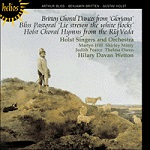 In
reviewing the new Chandos recording of Morning Heroes, coupled
with Hymn to Apollo –
DL News 2015/9 – I briefly mentioned this earlier recording of the
Hymn. The new recording is part of a first-class album which
I made Recording of the Month and considered for Recording
of the Year but I have since been reminding myself what a wonderful
bargain the earlier set is: two CDs for the price of one containing
very good performances, well recorded, albeit that it’s available for
download in mp3 only (for £8.40).
In
reviewing the new Chandos recording of Morning Heroes, coupled
with Hymn to Apollo –
DL News 2015/9 – I briefly mentioned this earlier recording of the
Hymn. The new recording is part of a first-class album which
I made Recording of the Month and considered for Recording
of the Year but I have since been reminding myself what a wonderful
bargain the earlier set is: two CDs for the price of one containing
very good performances, well recorded, albeit that it’s available for
download in mp3 only (for £8.40).
A short extract from the same recording of Pastoral, a wonderfully
evocative setting of the Idylls of Theocritus, progenitor of
the pastoral genre, is also available on a budget-price CD of ‘Byways
of British Music’, a collection of otherwise short pieces, on CHAN6611.
The only other stereo version of Pastoral comes on a very desirable
Hyperion collection, with Britten’s Choral Dances from Gloriana
and Holst’s third set of Choral Hymns from the Rig Veda. (CDH55050
Holst Singers and Orchestra/Hilary Davan Wetton [59:53]). That’s on
the Helios label, which has just been raised from budget- to full-price
but you may still find copies for around £6.50 and it can be downloaded
in mp3 and lossless for £7.99 from hyperion-records.co.uk.
It contains the texts, unlike the Chandos.
Warning: Caveat emptor .
Bliss Conducts Bliss
Sir Arthur BLISS
Mêlée fantasque (1921, rev. 1937 and 1965) [13:06]
Rout (1920) [7:24]
Adam Zero – Suite: Nos. 2, 4 and 5 (1946) [8:54]
Hymn to Apollo (1928, rev. 1964) [10:23]
Serenade (1929) [25:52]
The World is charged with the grandeur of God (1969) [13:31].
Rae Woodland (soprano); John Shirley-Quirk (baritone); Ambrosian Singers;
LSO Wind and Brass Ensemble;
London Symphony Orchestra/Sir Arthur Bliss, Brian Priestman, Philip
Ledger.
No rec. info. ADD
LYRITA SRCD.225 [79:13] – from emusic.com (mp3, NO booklet) but
see warning below.
I mentioned this recording and download of the revised version of Hymn
to Apollo when reviewing the recent Chandos recording where it’s
coupled with Morning Heroes.
Full marks to emusic.com for having re-mastered this and several other
older downloads in 320kb/s transfers but, unfortunately, I have to report
that the last four tracks, 10-13, the finale of the Serenade and the
whole of The World is charged, are unplayable owing to a series
of crackles and dropouts which also afflict other download versions
which I have tried. I have reported the issue – and received compensation
from emusic – but for the moment my advice has to be to obtain this
on CD.
Hilding ROSENBERG (1892-1985)
– Symphony No.2 [32:57] – Swedish Society lt33160: Stockholm
PO/Herbert Blomstedt (+ LIDHOLM Poesis [15:05]) [48:38]. No
CD: stream
(for subscribers) or download
from classicsonlinehd.com (16-bit lossless, with rudimentary booklet)
– Symphony No.3 [32:00] – Naxos Classical Archives 9.80751:
Stockholm PO/Tor Mann –
stream (for subscribers) or download
from classicsonlinehd.com (NO booklet).
– Symphony No.3 [32:28]; Symphony No.6 [22:41] – BIS-CD-1383:
Gothenburg SO/Mario Venzago [56:00] – from eclassical.com
(mp3, 16- and 24-bit lossless, with pdf booklet)
– Symphony No.3 [33:31]; Symphony No.6 [24:12] – Phono Suecia
PSCD100: Stockholm SO/Stig Westerberg; Stockholm PO/Herbert Blomstedt
[57:43] – from
emusic.com (mp3, NO booklet)
– Symphony No.3 [38:49]; Symphony No.4 [36:35] – Caprice CAP20518:
Swedish Radio Chorus; Stockholm PO/Hilding Rosenberg (narrator) – from
prestoclassical.co.uk
(mp3 and lossless).
– Symphony No.4 [78:52] – Caprice CAP21429: Håkan Hagegård;
Swedish Radio Choir; Gothenburg SO/Sixten Ehrling – from eclassical.com
(mp3 and lossless, NO booklet). Subscribers stream from classicsonlinehd.com.
Rosenberg’s star has never shone brightly in the UK: his centenary in
1992 went almost unnoticed and neither the last complete edition of
the Penguin Guide (2010) nor the final version of the Gramophone Guide
(2012) even gave 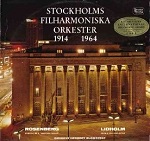 him
a space. Not much of his music is available on CD or as a download.
him
a space. Not much of his music is available on CD or as a download.
Knowing my interest in filling the gaps in my knowledge, our editor
Rob Barnett pointed out the attractions of the early symphonies. Symphony
No.2 ( Sinfonia Grave, 1928-34) recorded in 1964 is available
coupled with Ingvar Lidholm’s avant-garde work Poesis on the
Swedish Society label. The version from classicsonlinehd.com comes
with a rudimentary ‘booklet’, actually the sleeve of the LP in a very
small font and mostly in Swedish. Endearingly it contains a handwritten
note about the owner’s ‘Pappa’. The Lidholm – a series of crashes and
bangs – is hardly to my liking but the download is very important as
the only recording of the Rosenberg symphony in any format currently
available. Lovers of Sibelius and Nielsen should find themselves comfortably
at home here. Though recorded over fifty years ago the sound is more
than acceptable.
 No.3
(1939) has four downloads to its credit: on its own on a Naxos Classical
Archives recording from 1953, when it was still known as De fyra
Tidsaldrarna (The Four Ages of Mankind) – it had originally
been performed with recitations on that theme interspersed – with No.4
(below) and coupled with Symphony No.6 (1951) on BIS and Phono Suecia.
It’s a powerful work which deserves to be much better known and all
three performances do it justice. The historical Naxos has come up
sounding surprisingly well but even at budget price it’s very short
value. It’s worth streaming but the newer recordings are the ones to
go for, especially as they both also offer the Sixth, the so-called
Sinfonia Semplice, a work no ‘simpler’ than Nielsen’s similarly
oddly-name Sixth. Neither of these sixths is the sort of symphony that
sits in the corner and simpers.
No.3
(1939) has four downloads to its credit: on its own on a Naxos Classical
Archives recording from 1953, when it was still known as De fyra
Tidsaldrarna (The Four Ages of Mankind) – it had originally
been performed with recitations on that theme interspersed – with No.4
(below) and coupled with Symphony No.6 (1951) on BIS and Phono Suecia.
It’s a powerful work which deserves to be much better known and all
three performances do it justice. The historical Naxos has come up
sounding surprisingly well but even at budget price it’s very short
value. It’s worth streaming but the newer recordings are the ones to
go for, especially as they both also offer the Sixth, the so-called
Sinfonia Semplice, a work no ‘simpler’ than Nielsen’s similarly
oddly-name Sixth. Neither of these sixths is the sort of symphony that
sits in the corner and simpers.
Rob Barnett recommended the Phono Suecia, recorded in 1960 and 1966
– review
– but the BIS, more recently recorded (2004 and 2005), comes in better
sound and the download contains the brochure. Don’t judge this book
by its chocolate-box cover: these are idiomatic and powerful performances.
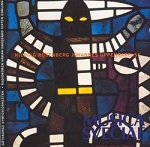 Symphony
No.4 (1940) is a choral symphony for baritone, chorus and orchestra,
with texts from the Book of Revelation, hence the title Johannes
Uppenbarelse. Rosenberg’s own recording offers only about half
the work and the sound is dated, so the newer (1992) recording under
Sixten Ehrling is the one to go for. The problem concerns the lack
of a booklet, which no download source seems to provide, so the listener
is left with just the opening words of each section in Swedish and English.
With a bible to hand that might not be too much of a problem but that
means missing out on the poems of Hjalmar Gullberg which are also set,
thus ruling out downloading this for many potential listeners. Fortunately
it’s still available on CD.
Symphony
No.4 (1940) is a choral symphony for baritone, chorus and orchestra,
with texts from the Book of Revelation, hence the title Johannes
Uppenbarelse. Rosenberg’s own recording offers only about half
the work and the sound is dated, so the newer (1992) recording under
Sixten Ehrling is the one to go for. The problem concerns the lack
of a booklet, which no download source seems to provide, so the listener
is left with just the opening words of each section in Swedish and English.
With a bible to hand that might not be too much of a problem but that
means missing out on the poems of Hjalmar Gullberg which are also set,
thus ruling out downloading this for many potential listeners. Fortunately
it’s still available on CD.
Next time I plan to survey Rosenberg’s String Quartets, the complete
series of which is available from Caprice – download from eclassical.com
or stream from Qobuz if you wish to do some preliminary exploration
of your own.
George ANTHEIL (1900-1959) Capital of the World [26:07]
Raffaelo de BANFIELD (1922-2008) Le Combat [21:23]
Ballet Theatre Orchestra/Joseph Levine – first released in UK on Capitol
CTL7081, 1955.
NAXOS CLASSICAL ARCHIVES 9.81188 [47:30] – from emusic.com
(mp3)
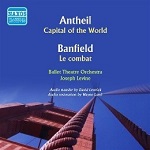
Despite the picture of what looks like a skyscraper on the cover, the
Capital of the World is not Antheil’s own New York but Madrid
and the plot involves a novice bull-fighter, hence the music’s nods
in the direction of Falla, though without the qualities that make his
music distinctive.
Raffaello de Banfield was actually the British-born Raphael Douglas,
Baron von Banfield Tripkovich. Like Antheil he moved in avant-garde
circles but is hardly remembered now: this is one of only two recordings
currently available in the UK and the other is also a vintage Naxos
offering: his opera Lord Byron’s Love Letter, recorded in 1958
and starring Astrid Varnay and Gertrude Ribla (Naxos Historical 8.111362).
Gerald FINZI (1901–1956)
Cello Concerto in a minor, Op.40 [39:10]
Raphael Wallfisch (cello)
Royal Liverpool Philharmonic Orchestra/ Vernon Handley
Prelude for string orchestra, Op.25 [5:00]
Romance for string orchestra, Op.11 [7:52]
Concerto for Small Orchestra and Solo Violin [20:05]
Tasmin Little (violin)
City of London Sinfonia/Richard Hickox
rec. 1986 and 1999. DDD
CHANDOS CHAN10425 [72:07] – from theclassicalshop.net
(mp3, 16- and 24-bit lossless, with pdf booklet)
 I
mentioned this recording briefly in comparing the Cello Concerto with
Yo Yo Ma on Lyrita in DL
Roundup June 2012/1.
I
mentioned this recording briefly in comparing the Cello Concerto with
Yo Yo Ma on Lyrita in DL
Roundup June 2012/1.
That Lyrita recording remains my recommendation for the Cello Concerto
but I was reminded recently by hearing the slow movement on Radio 3
what a beautiful work the Violin Concerto is, too, and this is not merely
the only available recording, it’s also first-rate in every respect.
(It’s also still available at full price in its original coupling, with
the Prelude and Romance, as here, plus In Years Defaced,
seven songs with John Mark Ainsley: CHAN9888).
CHAN10425 is at lower mid-price, but there’s one pricing oddity:
the mp3, at £6.00, is around the same price as the CD (typically £6.50,
though Amazon
UK have it for £5.99) but the 16-bit download, at £7.99, is considerably
more expensive. You would expect to pay more for the 24-bit, but £11.99
seems quite a large price hike over the other formats. It’s not the
first time that I have found the physical product to be less expensive
than the download but the logic of it all still puzzles me.
Bargain of the Month
Eduard TUBIN (1905-1982) Symphonies
Symphony No. 1 (1931-34) [32:21]
Symphony No. 2 The Legendary (1937-38) [31:45]
Symphony No. 3 (1940-42) [33:28]
Symphony No. 4 Sinfonia Lirica (1943/1978) [35:32]
Symphony No. 5 (1946) [30:15]
Symphony No. 6 (1954) [31:36]
Symphony No. 7 (1958) [25:45]
Symphony No. 8 (1966) [28:41]
Symphony No. 9 Sinfonia Semplice (1969) [22:22]
Symphony No. 10 (1973) [25:21]
Toccata (1937) [5:38]
Suite from the ballet Kratt (The Goblin) (1961) [23:55]
Swedish Radio SO (1, 2, 3, 6, 8)
Gothenburg SO (7, 9, 10,Toccata)
Bergen PO (4)
Bamberg SO (5, Kratt)
Neeme Järvi
rec. Berwald Hall, Stockholm: 20-23 Oct 1986 (1), 10-12 June 1985 (2,6),
16-19 Sept 1986 (3,8)
Grieg Hall, Bergen: 5 Nov 1982, public concert (4)
Dominikanerhaus, Bamberg: 1-3 July 1985 (5, Kratt)
Gothenburg Concert Hall, Sweden: 25-27 May 1987 (7), 4 Sept 1981 (9),
31 Oct 1986 (10), 2 Feb 1984 (Toccata) DDD/AAD
 BIS
BIS-CD-1402/1404 [63:20 + 64:01 + 62:46 + 65:24 + 75:49] 5 CDs
for the price of 3 – from eclassical.com
(mp3 and lossless with pdf booklet).
BIS
BIS-CD-1402/1404 [63:20 + 64:01 + 62:46 + 65:24 + 75:49] 5 CDs
for the price of 3 – from eclassical.com
(mp3 and lossless with pdf booklet).
At last eclassical are offering this insightful and authoritative set
at a reduced price, as has been the case with the CDs for many years:
Bargain of the Month – review
– review.
Warning: be sure to follow the link above, where eclassical have
the set for $29.82: they also offer the same set for almost twice the
price! A failure of logic again, especially as even the lower-price
version works out at current exchange rates more expensively for UK
purchasers than the CD set (£29.42 from
Amazon UK ; £34.75 from Presto).
For US purchasers, however, the download offers a useful discount over
ArkivMusic’s
$65.99 for the CDs.
Sir Malcolm ARNOLD (1921-2006)
Philharmonic Concerto, Op.120 (1976) [14:49]
Fantasy on a theme of John Field, Op.116 (1975) [22:09]
Symphony
No.7, Op.113 (1973) [31:13]
John FIELD (1782-1837)
Nocturne No.7 in C ‘Reverie’ (1821) [5:02]
Peter Donohoe (piano)
Royal Scottish National Orchestra/Martin Yates
rec. 2-3 June 2014, Henry Wood Hall, RSNO Centre, Glasgow. DDD/DSD
DUTTON EPOCH CDLX7318 [73:21] – from emusic.com
(mp3, NO notes)
 Three
powerful works which Arnold composed in the 1970s are brought together
here. None of it is easy listening – at this period he could turn even
a Field Nocturne into something with plenty of teeth. Dan Morgan thought
the fillers ‘absolutely cracking’ – review
– but there is strong competition in the symphony, from Andrew Penny
(Naxos 8.552001, Nos. 7 and 8: the box set which I reviewed is
no longer available), Rumon Gamba (Chandos: CHAN9967, mid-price,
Nos.7-9 and Oboe Concertino or CHAN10853, budget price, Complete
Symphonies: Nos. 1-6 directed by Richard Hickox).
Three
powerful works which Arnold composed in the 1970s are brought together
here. None of it is easy listening – at this period he could turn even
a Field Nocturne into something with plenty of teeth. Dan Morgan thought
the fillers ‘absolutely cracking’ – review
– but there is strong competition in the symphony, from Andrew Penny
(Naxos 8.552001, Nos. 7 and 8: the box set which I reviewed is
no longer available), Rumon Gamba (Chandos: CHAN9967, mid-price,
Nos.7-9 and Oboe Concertino or CHAN10853, budget price, Complete
Symphonies: Nos. 1-6 directed by Richard Hickox).
The emusic download is inexpensive – £3.36 or less for subscribers –
and though it comes in mp3 only, like all their recent releases it’s
at the full 320kbs bit-rate. No doubt the SACD sounds superb but the
download is no slouch. Qobuz offer it for £7.99, assuming that they
are still in business when you read this, and they don’t offer the booklet
either. It seems that the problem stems from Dutton, who seem to treat
downloads as poor cousins: I’ve yet to find any of their music as a
download with the booklet.
Pierre BOULEZ (1925-2016)
Le Marteau sans Maître (1953-55) [38:29]
Dérive 1 and 2 (1994, 2002) [5:47 + 22:43]
Hilary Summers (mezzo)
Ensemble Intercontemporain/Pierre Boulez
rec. IRCAM, Paris, September 2002. DDD.
DG 4790565 [68:49] – streamed from Qobuz,
with pdf booklet.
 De
mortuis nil nisi bonum … Fifty years ago a colleague returned from
a holiday in France with LPs of Le Marteau and Pli selon pli,
which were not then generally available in the UK – I think the composer’s
own recording of Le Marteau with Domaine Musical* – and tried
to convince me of Boulez’s genius. I couldn’t make much sense of it
– it sounded more like mere noise than music and, frankly, there was
much better repertoire to get to know. Following the announcement of
the death of Boulez, I thought I might give the music another chance
from this more recent recording, featuring his own group, Ensemble Intercontemporain.
It’s not just my imagination that the music sounds more approachable
than it did because I tried both recordings and I found it more amenable
than the older version. Perhaps the maître himself had mellowed,
or perhaps it’s because the instruments are better balanced. I still
wouldn’t be likely to make it part of my regular listening, but who
knows …? I can’t, however, recommend the Qobuz download at £11.56 when
the CD can be yours for around £8.50. The 7digital.com 16-bit at £12.99
is even further hors de combat.
De
mortuis nil nisi bonum … Fifty years ago a colleague returned from
a holiday in France with LPs of Le Marteau and Pli selon pli,
which were not then generally available in the UK – I think the composer’s
own recording of Le Marteau with Domaine Musical* – and tried
to convince me of Boulez’s genius. I couldn’t make much sense of it
– it sounded more like mere noise than music and, frankly, there was
much better repertoire to get to know. Following the announcement of
the death of Boulez, I thought I might give the music another chance
from this more recent recording, featuring his own group, Ensemble Intercontemporain.
It’s not just my imagination that the music sounds more approachable
than it did because I tried both recordings and I found it more amenable
than the older version. Perhaps the maître himself had mellowed,
or perhaps it’s because the instruments are better balanced. I still
wouldn’t be likely to make it part of my regular listening, but who
knows …? I can’t, however, recommend the Qobuz download at £11.56 when
the CD can be yours for around £8.50. The 7digital.com 16-bit at £12.99
is even further hors de combat.
* Directed by Boulez and still available: subscribers stream
from Qobuz – purchase
for £3.99.
William MATHIAS (1934-1992)
Symphony No.1 Op.31 (1966) [31:00]
Symphony No.2 (Summer Music) Op.90 (1983) [28:17]
BBC Welsh Symphony Orchestra/William Mathias
rec. Great Hall, Birmingham University, No. 1: 25 March 1990; No. 2:
18 March 1990. DDD
NIMBUS NI5260 [59:25] – from emusic.com
(mp3, NO booklet)
Helios, Op. 76 (1977) [15:02]
Oboe Concerto (1989) [16:26]
Requiescat, Op. 79 (1977) [8:51]
Symphony No. 3 (1991) [31:24]
David Cowley (oboe)
BBC Welsh Symphony Orchestra/Grant Llewellyn
rec. Brangwyn Hall, Swansea, 11 November 1991; 11 February 1992. DDD
NIMBUS NI5343 [72:22] – from emusic.com
(mp3, NO booklet)

 Of
these two recordings Rob Barnett wrote ‘the results repay the listener
in bell-haunted spells, enchanted coinage and sturdy Celtic magic’ –
review–
and that’s as good a summing-up as you’re likely to find. The performances
are authoritative, with the composer himself directing the first album
and supervising the second.
Of
these two recordings Rob Barnett wrote ‘the results repay the listener
in bell-haunted spells, enchanted coinage and sturdy Celtic magic’ –
review–
and that’s as good a summing-up as you’re likely to find. The performances
are authoritative, with the composer himself directing the first album
and supervising the second.
The emusic downloads are very inexpensive but they come at a low bit-rate
and there’s no booklet, so you may prefer to order the CDs at a competitive
price from MusicWeb – use the purchase button on Rob Barnett’s review.
NI5343 is better, at around 230kbs, not far short of what you would
get from iTunes and Amazon; NI5260 is less good, at around 185kbs, but
the result in both cases is tolerable.
Chinary UNG (b. 1942)
Water Rings Overture (1993) [6:46]
Anicca (1970) [8:27]
Antiphonal Spirals (1995) [11:03]
Singing inside Aura (2013) [14:34]
Grand Spiral: Desert Flowers Bloom (1991) [13:19]
Susan Ung (viola and voice)
Boston Modern Orchestra Project/Gil Rose
BMOP SOUND 1044 [54:10] Reviewed as press wav download. Download
from amazon.co.uk (mp3: also available on hybrid SACD). Stream (for subscribers)
from Qobuz.
 It’s
rare that I find much to enjoy in contemporary music but BMOP have provided
me with two examples this month and Naxos with another. Chinary Ung
was born in Cambodia and now works in the USA and his blend of East
and West is very appealing. You don’t even have to get into the intricacies
of the Buddhist philosophy which underlies much of his work to enjoy
his music, though for me it’s an added bonus.
It’s
rare that I find much to enjoy in contemporary music but BMOP have provided
me with two examples this month and Naxos with another. Chinary Ung
was born in Cambodia and now works in the USA and his blend of East
and West is very appealing. You don’t even have to get into the intricacies
of the Buddhist philosophy which underlies much of his work to enjoy
his music, though for me it’s an added bonus.
The notes, by Chinary Ung himself and, in more detail, by Adam Greene,
are helpful and informative: I received the booklet with the press download
and it’s more than a shame that neither Amazon nor Qobuz offer it with
the download so you may prefer to buy the SACD.
If you would like to explore Chinary Ung’s music further, classicsonlinehd.com
have the Cambria album of Aura, Oracle and Still Life
after Death (CMCD-8854: no notes). Stream for subscribers
here
or download for £7.99 here.
Roberto SIERRA (b. 1953)
Sinfonía No.3 ‘La Salsa’ (2005) [28:31]
Borikén (2005) [14:14]
El Baile (2012) [9:36]
Beyond the Silence of Sorrow (2002)* [22:20]
Martha Guth (soprano)*
Puerto Rico Symphony Orchestra/Maximiano Valdés
Rec. Sala Sinfónica Pablo Casals, San Juan, Puerto Rico, 10-13 September
2014. DDD
NAXOS AMERICAN CLASSICS 8.559817 [74:42] – stream (for subscribers)
or download from classicsonlinehd.com.
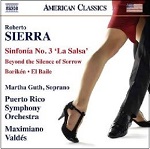 I
seem to have hit a seam of gold this month, with works by three contemporary
composers to which I can not only relate but also enjoy: Ung (above),
the Puerto-Rican Roberto Sierra and Bates (below). Deep joy, as Staley
Unwin used to say.
I
seem to have hit a seam of gold this month, with works by three contemporary
composers to which I can not only relate but also enjoy: Ung (above),
the Puerto-Rican Roberto Sierra and Bates (below). Deep joy, as Staley
Unwin used to say.
The major work, the ‘Salsa’ symphony is, as you would expect, largely
in dance form, with movements entitled Tumbao (an Afro-Cuban
dance form), Habanera, Danzas and Jolgorio (= fiesta,
diversion), but it’s far from facile: the second movement is as sensuous
as Ravel but it’s also reflective and even dark in tone in places. Most
of the other music, too, has roots in the dance music that must be second
nature to the Puerto Rico Symphony Orchestra who, under the direction
of Maximiano Valdés, give idiomatic performances. The recording is
16-bit only, but no worse for that.
Mason BATES (b.1977)
Mothership (2010) [9:22]
Sea-Blue Circuitry (2010) [12:29]
Attack Decay Sustain Release (2013) [4:39]
Rusty Air in Carolina (2006) [13:37]
Desert Transport (2010) [14:13]
Jason Moran (FM Rhodes)
Su Chang (Guzheng)
Boston Modern Orchestra Project/Gil Rose
rec. 30 June 2014, 24 September 2014 and 26 September 2014, Jordan Hall,
Boston, MA.
BMOP SOUND 1045 [54:22]
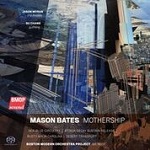 Reviewed
as press wav download. Available for streaming by subscribers from
Qobuz
or for purchase (no booklet). Hybrid SACD from Amazon
UK or Amazon US .
Reviewed
as press wav download. Available for streaming by subscribers from
Qobuz
or for purchase (no booklet). Hybrid SACD from Amazon
UK or Amazon US .
Regular readers will know how averse I am to the sort of avant-garde
music which merely seeks to annoy old fogies like myself – if that’s
the intention, it surely works – and how delighted I am to be able to
welcome works by contemporary composers which are a joy to listen to.
There’s the odd item here that I shall have to come to terms with but
nothing that I find harder to absorb than, say, the music of Toru Takemitsu.
Indeed, I mention Takemitsu not just because of the use of an oriental
instrument, the Guzhen, a kind of Chinese zither, in the title work
Mothership; I also hear what I think may be his influence in
Rusty Air in Carolina.
Another clear influence is jazz but most of all this is music in a clear
line of descent from the likes of Copland and Bernstein. The cover
illustration and a double spread in the booklet are of urban landscapes
but Rusty Air and Desert Transport breathe the open spaces
of America as much as Appalachian Spring. The performances are
authoritative, the recording very good and the notes – a brief set from
the composer and in more detail from Thomas May – are very helpful.
Historic Grenadiers Volume 2
including Kenneth ALFORD On the Quarterdeck; Great
Little Army; Vanished Army; The Middy; Émile WALDTEUFEL
Grenadier’s Waltz; Abe HOLZMANN Blaze away; Mike LAKE
Evolution of Dixie.
Band of the Grenadier Guards/Lt. Colonel George Miller
rec. 1926-1940. ADD/mono 78s
BEULAH 2PD19 [68:48] – due shortly from iTunes (mp3)
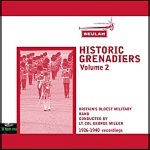
Volume 1 (1PD1) was released quite some time ago on CD and remains
available for £10 from Presto.
More recent recordings from the Grenadier Guards can be found on other
Beulah albums: Bandstand Music and Kenneth Alford: The British
March King (DL
News 2015/10). You may expect the 78 transfers on the new album
to sound impossibly dated but they have for the most part come up sounding
very well and they will, I’m sure, appeal to the many fans of military
music, catering for whom is one of Beulah’s specialities. They got
my feet tapping if not exactly marching around. Tonally the recordings
are secure, though some of the oldest items sound a bit crumbly, and
there’s very little surface noise – reduced almost to an occasional
light patter of ghostly feet without sacrificing any wanted frequencies.
Neujahrskonzert 2016 (New Year’s Day Concert)
Robert STOLZ (1880-1975) UNO – Marsch [3:28]
Johann STRAUSS II (1825-1899) Schatz-Walzer, Op.418 [8:06]
Violetta, Polka française, Op.404 [4:29]
Vergnügungszug, Polka schnell, Op.281 [3:01]
Carl Michael ZIEHRER (1843-1922) Weaner Mad’ln, Walzer,
Op.388 [10:27]
Eduard STRAUSS (1835-1916) Mit Extrapost, Polka schnell,
Op.259 [2:20]
Johann STRAUS II Eine Nacht in Venedig: Ouvertüre [8:09]
Eduard strauss Außer Rand und Band, Polka schnell, Op.168
[2:08]
Josef STRAUSS (1827-1870) Sphärenklänge, Walzer, Op.235
[10:04]
Johann STRAUS II Sängerslust, Polka française, Op.328
[3:47]
Josef STRAUSS Auf Ferienreisen, Polka schnell, Op.133
[2:43]
Johann STRAUS II Fürstin Ninetta: Entr’acte Akt III [3:40]
Émil WALDTEUFEL (1837-1915) (after Emmanuel CHABRIER)
España, Walzer, Op.236 [5:49]
Josef Hellmesberger I (1828-1893) Ballszene [5:05]
Johann STRAUSS I (1804-1849) Seufzer-Galopp, Op.9 [2:11]
Josef STRAUSS Die Libelle, Polka Mazur, Op.204 [5:28]
Johann STRAUS II Kaiser-Walzer, Op.437 [11:32]
Auf der Jagd, Polka schnell, Op.373 [2:31]
Im Sturmschritt, Polka schnell, Op.348 [2:30]
Neujahrsgruß (New Year’s Address) [0:43]
Johann STRAUS II An der schönen blauen Donau, Op.314
[10:31]
Johann STRAUSS I Radetzky-Marsch, Op.228 [3:47]
Vienna Boys’ Choir;
Vienna Philharmonic Orchestra/Mariss Jansons
rec. 1 January 2016, Goldenersaal, Musikverein, Vienna. DDD
 SONY
88875174772 [1:52:42] –
lossless download with pdf booklet from Qobuz (available in 16-
and 24-bit formats and for streaming
by subscribers)
SONY
88875174772 [1:52:42] –
lossless download with pdf booklet from Qobuz (available in 16-
and 24-bit formats and for streaming
by subscribers)
This year’s contribution may not quite be in the same league as the
classic Strauss Family recordings which Willi Boskovsky made with the
Vienna Phil (Decca) and with his own smaller ensembles (Alto and Warner)
or on New Year’s Day by Herbert von Karajan (1987) or Carlos Kleiber
(1989 and 1992) but it’s not for nothing that Mariss Jansons was invited
back for the third time this year.
My full review of this year’s enjoyable concert is due to appear on
the main MusicWeb International webpage shortly.
World Music/Bargain of the Month
Rág Ahír Bhairav [50:55]
Uttar Pradesh Marriage Song [16:06]
Hariprasad Chaurasia (flute)
Sabir Khan (tablá)
Recording released 2003. Rec. 1988?
NIMBUS NI5111 [67:01] – from emusic.com
(mp3, NO booklet)

 I
have absolutely no qualification to write about Indian classical music
but I do like to dabble and to go beyond Ravi Shankar and the other
obvious recordings which have impinged on the Western conscious since
the 1960s, most of which reduce an evening’s rág into the shorter
compass of US and European concentration spans. Even here, where the
beautifully plangent major work runs to almost an hour, I imagine that
some pruning has taken place. This is one of their older offerings
which emusic have refurbished in very acceptable 320kb/s sound. On
just two tracks, it’s a bargain at £0.84.
I
have absolutely no qualification to write about Indian classical music
but I do like to dabble and to go beyond Ravi Shankar and the other
obvious recordings which have impinged on the Western conscious since
the 1960s, most of which reduce an evening’s rág into the shorter
compass of US and European concentration spans. Even here, where the
beautifully plangent major work runs to almost an hour, I imagine that
some pruning has taken place. This is one of their older offerings
which emusic have refurbished in very acceptable 320kb/s sound. On
just two tracks, it’s a bargain at £0.84.
Subscribers
to Qobuz can stream another Hariprasad Chaurasia Nimbus recording,
with Fazal Qureshi (tablá): Rág Bhímpalásí. That also comes
on two tracks only from emusic.com
so cost just £0.84 to download, albeit without booklet and at a variable
bitrate. (NI5298 – rec. 1990?) [76:05]).
For a more approachable recording for Western listeners, there’s Ravi
Shankar’s Symphony, performed by his daughter Anoushka with the LPO
and David Murphy, which I reviewed in September
2012/2. The classicsonline.com link no longer applies: it’s now
available in lossless form from classicsonlinehd.com
but the price paradox persists. The download, at £7.99, costs more
than you would pay for the disc – Presto
have the CD for £5.50 but charge £8.00 for mp3 and £9.75 for lossless.
Logic?



 All Nimbus reviews
All Nimbus reviews








